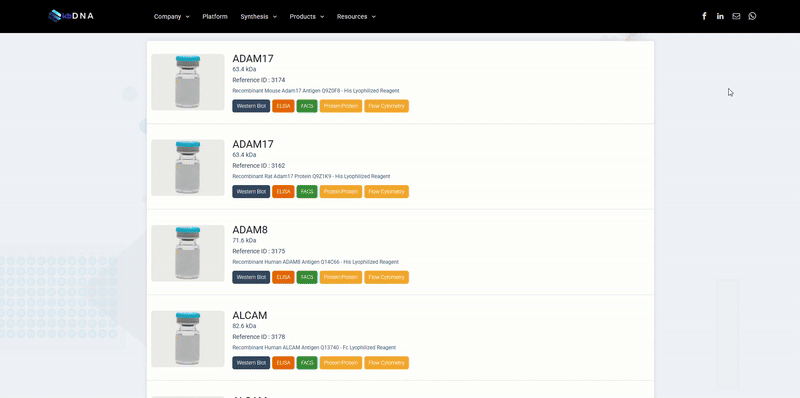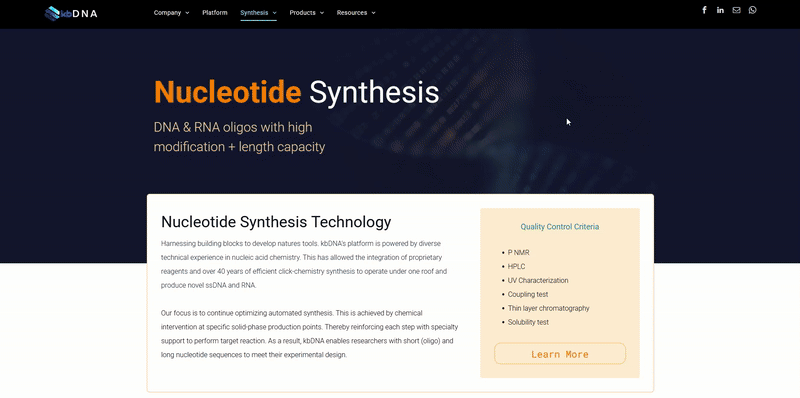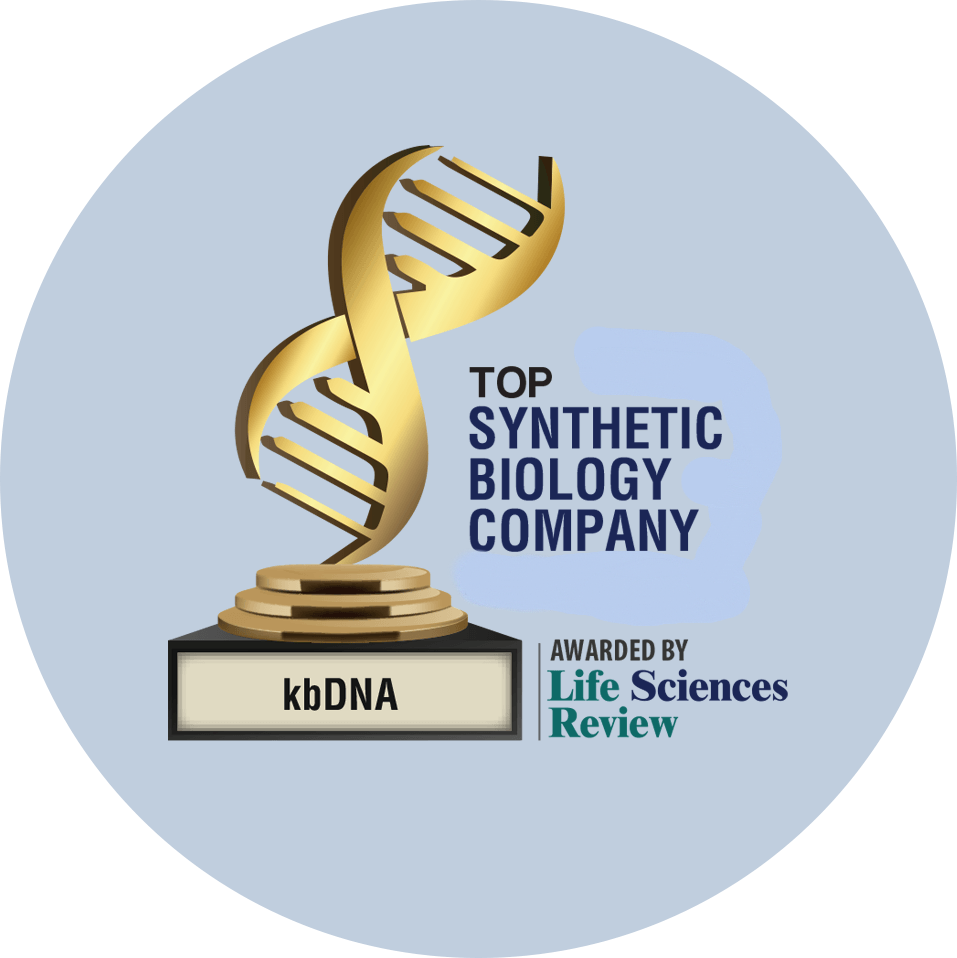MICA
Recombinant ID:
3951
Request Datasheet
Gene of Interest
Gene Synonyms:
Protein Names:
Accession Data
Organism:
Homo sapiens (Human)
Mass (kDa):
42915
Length (aa):
383
Sequence:
MGLGPVFLLLAGIFPFAPPGAAAEPHSLRYNLTVLSWDGSVQSGFLTEVHLDGQPFLRCDRQKCRAKPQGQWAEDVLGNKTWDRETRDLTGNGKDLRMTLAHIKDQKEGLHSLQEIRVCEIHEDNSTRSSQHFYYDGELFLSQNLETKEWTMPQSSRAQTLAMNVRNFLKEDAMKTKTHYHAMHADCLQELRRYLKSGVVLRRTVPPMVNVTRSEASEGNITVTCRASGFYPWNITLSWRQDGVSLSHDTQQWGDVLPDGNGTYQTWVATRICQGEEQRFTCYMEHSGNHSTHPVPSGKVLVLQSHWQTFHVSAVAAAAIFVIIIFYVRCCKKKTSAAEGPELVSLQVLDQHPVGTSDHRDATQLGFQPLMSDLGSTGSTEGA
Proteomics (Proteome ID):
MHC class I polypeptide-related sequence A (MIC-A)
Proteomics (Chromosome):
UP000005640
Mass Spectrometry:
N/A
Function [CC]:
Seems to have no role in antigen presentation. Acts as a stress-induced self-antigen that is recognized by gamma delta T-cells. Ligand for the KLRK1/NKG2D receptor. Binding to KLRK1 leads to cell lysis. {ECO:0000269|PubMed:10426993, ECO:0000269|PubMed:11224526, ECO:0000269|PubMed:11491531, ECO:0000269|PubMed:11777960, ECO:0000269|PubMed:9497295}.
Metal Binding:
N/A
Site:
N/A
Tissue Specificity:
Widely expressed with the exception of the central nervous system where it is absent. Expressed predominantly in gastric epithelium and also in monocytes, keratinocytes, endothelial cells, fibroblasts and in the outer layer of Hassal's corpuscles within the medulla of normal thymus. In skin, expressed mainly in the keratin layers, basal cells, ducts and follicles. Also expressed in many, but not all, epithelial tumors of lung, breast, kidney, ovary, prostate and colon. In thyomas, overexpressed in cortical and medullar epithelial cells. Tumors expressing MICA display increased levels of gamma delta T-cells. {ECO:0000269|PubMed:10359807, ECO:0000269|PubMed:10363723, ECO:0000269|PubMed:10691930, ECO:0000269|PubMed:12902493, ECO:0000269|PubMed:17565371, ECO:0000269|PubMed:8901601, ECO:0000269|PubMed:9396860}.
Disease:
Note=Anti-MICA antibodies and ligand shedding are involved in the progression of monoclonal gammopathy of undetermined significance (MGUS)to multiple myeloma.; Psoriasis 1 (PSORS1) [MIM:177900]: A common, chronic inflammatory disease of the skin with multifactorial etiology. It is characterized by red, scaly plaques usually found on the scalp, elbows and knees. These lesions are caused by abnormal keratinocyte proliferation and infiltration of inflammatory cells into the dermis and epidermis. Note=Disease susceptibility is associated with variations affecting the gene represented in this entry.; Psoriatic arthritis (PSORAS) [MIM:607507]: An inflammatory, seronegative arthritis associated with psoriasis. It is a heterogeneous disorder ranging from a mild, non-destructive disease to a severe, progressive, erosive arthropathy. Five types of psoriatic arthritis have been defined: asymmetrical oligoarthritis characterized by primary involvement of the small joints of the fingers or toes; asymmetrical arthritis which involves the joints of the extremities; symmetrical polyarthritis characterized by a rheumatoid like pattern that can involve hands, wrists, ankles, and feet; arthritis mutilans, which is a rare but deforming and destructive condition; arthritis of the sacroiliac joints and spine (psoriatic spondylitis). {ECO:0000269|PubMed:10323458}. Note=Disease susceptibility is associated with variations affecting the gene represented in this entry.
Mutagenesis:
N/A
Reagent Data
Name:
MHC class I polypeptide-related sequence A (MIC-A)
Class:
Subcategory:
Recombinant
Molecular Weight:
Source:
Species:
Human
Amino Acid Sequence:
Tag:
Format:
Lyophilized
Formulation:
Sterile-filtered colorless solution
Formulation Concentration:
1mg/ml
Buffer Volume:
Standard
Buffer Solution:
PBS
pH:
7.4-7.5
Stabilizers
NaCl:
Null
Metal Chelating Agents
EDTA:
Null
Purity:
> 98%
Determined:
SDS-PAGE
Stained:
Inquire
Validated:
RP-HPLC
Sample Handling
Storage:
-20°C
Stability:
This bioreagent is stable at 4°C (short-term) and -70°C(long-term). After reconstitution, sample may be stored at 4°C for 2-7 days and below -18°C for future use.
Preparation:
Reconstitute in sterile distilled H2O to no less than 100ug/ml; dilute reconstituted stock further in other aqueous solutions if needed. Please review COA for lot-specific instructions. Final measurements should be determined by the end-user for optimal performance.












